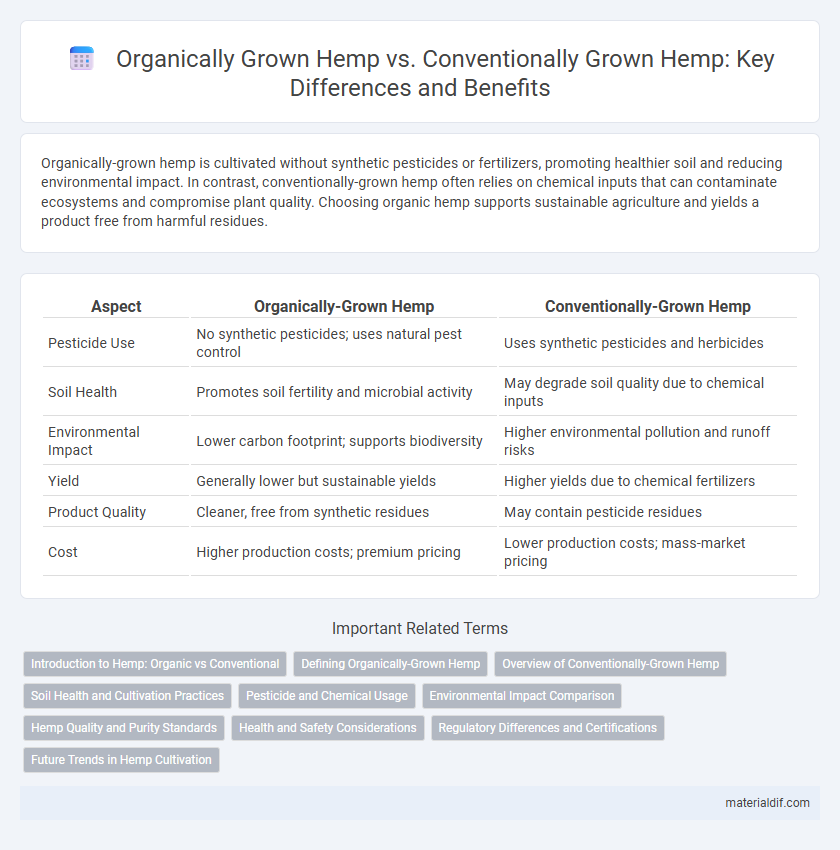Organically-grown hemp is cultivated without synthetic pesticides or fertilizers, promoting healthier soil and reducing environmental impact. In contrast, conventionally-grown hemp often relies on chemical inputs that can contaminate ecosystems and compromise plant quality. Choosing organic hemp supports sustainable agriculture and yields a product free from harmful residues.
Table of Comparison
| Aspect | Organically-Grown Hemp | Conventionally-Grown Hemp |
|---|---|---|
| Pesticide Use | No synthetic pesticides; uses natural pest control | Uses synthetic pesticides and herbicides |
| Soil Health | Promotes soil fertility and microbial activity | May degrade soil quality due to chemical inputs |
| Environmental Impact | Lower carbon footprint; supports biodiversity | Higher environmental pollution and runoff risks |
| Yield | Generally lower but sustainable yields | Higher yields due to chemical fertilizers |
| Product Quality | Cleaner, free from synthetic residues | May contain pesticide residues |
| Cost | Higher production costs; premium pricing | Lower production costs; mass-market pricing |
Introduction to Hemp: Organic vs Conventional
Organically-grown hemp is cultivated without synthetic pesticides, herbicides, or fertilizers, promoting soil health and biodiversity, whereas conventionally-grown hemp often relies on chemical inputs for higher yields and pest control. Organic hemp farming emphasizes sustainable practices that reduce environmental impact and produce crop free from chemical residues. Consumers increasingly prefer organic hemp products for their potential health benefits and eco-friendly attributes.
Defining Organically-Grown Hemp
Organically-grown hemp is cultivated without synthetic pesticides, herbicides, or genetically modified organisms, ensuring a natural growth process that supports environmental sustainability. This method emphasizes soil health through crop rotation, composting, and organic fertilizers, resulting in hemp with potentially higher cannabinoid profiles and fewer chemical residues. Consumers seeking eco-friendly and safer hemp products often prefer organically-grown hemp for its purity and reduced ecological impact.
Overview of Conventionally-Grown Hemp
Conventionally-grown hemp relies heavily on synthetic fertilizers, pesticides, and herbicides to maximize yield and control pests. This method often results in faster growth but increases the risk of chemical residues in the final product, potentially impacting environmental sustainability and consumer health. Despite higher productivity, conventionally-grown hemp may contribute to soil degradation and water pollution due to intensive chemical usage.
Soil Health and Cultivation Practices
Organically-grown hemp significantly improves soil health through crop rotation and the avoidance of synthetic pesticides and fertilizers, which enhances microbial activity and nutrient retention. Conventional hemp cultivation often relies on chemical inputs that can degrade soil structure and biodiversity over time. Sustainable organic practices result in healthier soils that support long-term hemp productivity and environmental balance.
Pesticide and Chemical Usage
Organically-grown hemp is cultivated without synthetic pesticides or chemical fertilizers, reducing the risk of harmful residue in the final product. Conventional hemp farming often relies on chemical pesticides and herbicides to maximize yields and prevent pest damage, which can compromise product purity and environmental safety. Choosing organically-grown hemp supports sustainable agriculture and ensures cleaner, safer hemp-based products free from toxic contaminants.
Environmental Impact Comparison
Organically-grown hemp reduces environmental impact by eliminating synthetic pesticides and fertilizers, promoting soil health and biodiversity. Conventional hemp farming often relies on chemical inputs that can lead to soil degradation and water contamination. Organic practices enhance carbon sequestration and support sustainable ecosystems, making them a greener alternative for hemp cultivation.
Hemp Quality and Purity Standards
Organically-grown hemp adheres to strict purity standards by avoiding synthetic pesticides, herbicides, and fertilizers, resulting in higher-quality hemp with fewer chemical residues. Conventionally-grown hemp often contains traces of agrochemicals, which can compromise the cannabinoid profile's integrity and introduce contaminants into the final product. Maintaining rigorous quality control through organic cultivation enhances the safety, potency, and overall effectiveness of hemp-derived goods.
Health and Safety Considerations
Organically-grown hemp is cultivated without synthetic pesticides, herbicides, or fertilizers, significantly reducing exposure to harmful chemicals and promoting safer consumption for both consumers and cultivators. Conventionally-grown hemp often relies on chemical inputs that may leave toxic residues, posing potential health risks and environmental contamination. Prioritizing organic hemp supports improved soil health, biodiversity, and minimizes the presence of heavy metals and pesticide residues in hemp-derived products.
Regulatory Differences and Certifications
Organically-grown hemp adheres to strict regulations set by certification bodies such as the USDA Organic Program, requiring no synthetic pesticides, herbicides, or genetically modified organisms (GMOs), while conventionally-grown hemp allows limited use of these substances under agricultural guidelines. Certified organic hemp involves regular inspections, soil testing, and record-keeping to ensure compliance with organic standards, which helps farmers access premium markets and higher prices. Conventional hemp, subject to broader regulatory oversight primarily focused on THC levels and crop safety, often lacks the rigorous validation processes essential for organic certification.
Future Trends in Hemp Cultivation
Organically-grown hemp is gaining traction due to rising consumer demand for sustainable and chemical-free products, driving innovation in natural pest control and soil health management. Future trends in hemp cultivation emphasize regenerative agriculture practices, which improve biodiversity and carbon sequestration while maintaining high yield quality. Conventional methods may decline as stricter environmental regulations and increasing awareness of chemical residues shift market preference toward organic hemp production.
organically-grown hemp vs conventionally-grown hemp Infographic

 materialdif.com
materialdif.com